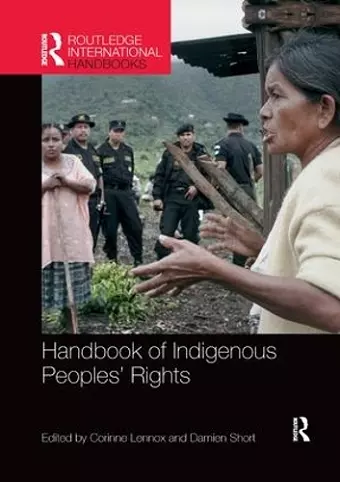Handbook of Indigenous Peoples' Rights
Damien Short editor Corinne Lennox editor
Format:Paperback
Publisher:Taylor & Francis Ltd
Published:18th Sep '18
Currently unavailable, and unfortunately no date known when it will be back
This paperback is available in another edition too:
- Hardback£290.00(9781857436419)

This handbook is a comprehensive interdisciplinary overview of indigenous peoples’ rights. Chapters by experts in the field examine legal, philosophical, sociological and political issues, addressing a wide range of themes at the centre of debates on the rights of indigenous peoples. The book addresses not only the major questions, such as ‘Who are indigenous peoples? What is distinctive about their rights? How are their rights constructed and protected? What is the relationship between national indigenous rights regimes and international norms?’ but also themes such as culture, identity, genocide, globalization and development, and the environment.
The book is divided into eight sections, which will each discuss and analyse a number of themes at the heart of the debates on the rights of indigenous peoples.
- Part 1: Indigeneity
- Part 2: Rights and Governance
- Part 3: Indigenous Women's Rights
- Part 4: Development and the Environment
- Part 5: Mobilization for Indigenous Peoples' Rights
- Part 6: Justice and Reparations
- Part 7: International Monitoring and Mechanisms for Indigenous Peoples' Rights
- Part 8: Regional Case Studies
This book will be essential reading for academics working in the field, students on courses in human rights, international relations, political science, philosophy, sociology and law. It will also be of interest to practitioners and activists working in the indigenous rights field and in the human rights field more generally.
"In 2007, the United Nations General Assembly adopted the UN Declaration on Rights of Indigenous Peoples (UNDRIP). Though not legally binding, the declaration provides the basis for the existing and emerging human rights claims associated with indigenous peoples. This large handbook includes an introductory overview of the field of indigenous rights and is followed by 27 chapters focusing on a variety of issues related to the topic. These include the philosophical basis of indigenous rights, governance, the rights of women, development, the environment, political mobilization, and reparations. The last four chapters address specific case studies on advancing and protecting indigenous rights. Though many of the scholars and activists contributing to this handbook acknowledge the contested nature of these rights, the writers are generally sympathetic to the political, economic, social, and cultural claims of indigenous peoples. Given the new and emerging nature of this type of group rights, this comprehensive handbook provides an excellent introduction to the subject. This handbook is recommended for international organization scholars, human rights specialists, international relations students, and general readers.
Summing Up: Recommended. General readers through professionals."
M. Amstutz, Wheaton College - CHOICE
ISBN: 9781857439762
Dimensions: unknown
Weight: 810g
496 pages